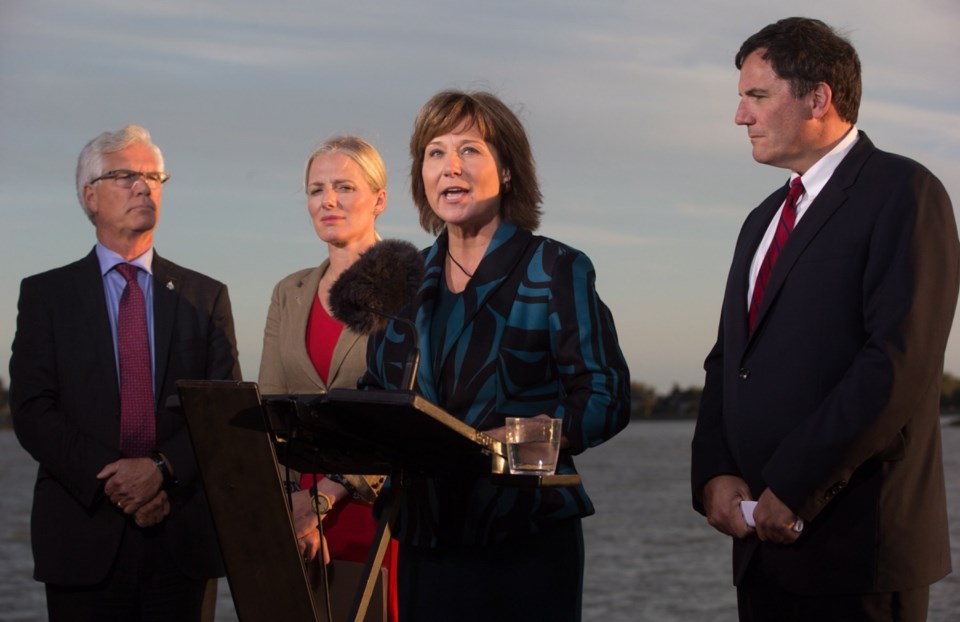 Midway through listing all the good things happening in B.C. — always the mainstay of any premier’s speech to the Union of B.C. Municipalities — Premier Christy Clark touched on this week’s federal approval of one of the LNG proposals.
Midway through listing all the good things happening in B.C. — always the mainstay of any premier’s speech to the Union of B.C. Municipalities — Premier Christy Clark touched on this week’s federal approval of one of the LNG proposals.
A warm round of applause rolled through the room. You couldn’t call it a definitive poll of where B.C. stands. But elected representatives from every corner of B.C. are a pretty good indicator of public mood. And when they spontaneously put their hands together at the mention of a controversial issue, it’s at least a signal that there is considerable support for LNG.
It has been so over-hyped by the B.C. Liberals for so long that the absence of any tangible progress has created a degree of cynicism about the mammoth concept. Sill, the idea of a $36-billion project taking shape, and pumping hundreds of millions of dollars worth of paycheques and hundreds of millions more in tax dollars into assorted communities still has the power to get community leaders excited.
There was a wave of criticism from environmental groups, opposing politicians and some First Nations after Ottawa announced Pacific Northwest LNG’s proposal near Prince Rupert had received approval after more than 1,100 days of review. The criticism was based on legitimate fears about the impact on greenhouse-gas emissions or salmon habitat, or other environmental issues. But the negatives are based mostly on abstract arguments about numbers — the percentage increase in emissions, the potential loss of salmon in a localized area.
UBCM delegates are local politicians, so by definition they are much more interested in people. And the potential impact on people seems to spur a much more positive reaction. That impact is simply a surge of wealth through communities that badly need it.
There was a rally prior to Clark’s speech — a lobby group helped organize it — where assorted mayors stood in support of getting any and all natural resources to market.
Fort St. John Mayor Lori Ackerman said: “The silent majority of British Columbians actually favour sustainable, responsible resource development.”
She said they can no longer remain silent; they need to activate their voice and support getting full access to world markets, for all Canadian and British Columbian natural resources.
In other words, get LNG going, build an oil pipeline and keep coal exports up, as well. There were fewer than 100 people there, but many of them represented communities of many more. And Ackerman made a point of introducing two prominent union leaders.
“The silent majority should understand they can attend these consultation processes [on pipelines and the like] and not be bullied,” she said. “We need to stand up.”
The “silent majority” is a concept that dates back to the Nixon presidency, where it was used to reassure middle-class people that the 1960s’ social unrest was all fomented by loudmouth minorities. That was a debatable proposition and the phrase didn’t age well.
But stripped of all the baggage from that era, you have to wonder if there isn’t a sizable constituency in B.C. that doesn’t issue news releases or dwell on social media and that’s more than willing to support the pipelines and plants involved in getting resources to the coast.
The Kinder Morgan pipeline proposal to the port of Vancouver seems to be strongly opposed, to the point where it’s considered a given that B.C. is opposed.
It will never go to a provincial referendum, but you have to wonder whether the result wouldn’t be a little surprising if it did.
LNG is easier for many to support, but B.C. support is now irrelevant — the decision to go ahead depends entirely on the market, which collapsed two years ago.
Clark campaigned in 2013 on extravagant promises of LNG wealth. Even with the federal approval, she conceded Wednesday: “The market will decide when the project goes ahead. It’s just a matter of watching the market and hoping that the company and their customers will decide it’s healthy enough to move ahead.”
The specific project could still easily fail. But the approval breaks some ice for several of the others in the lineup.



